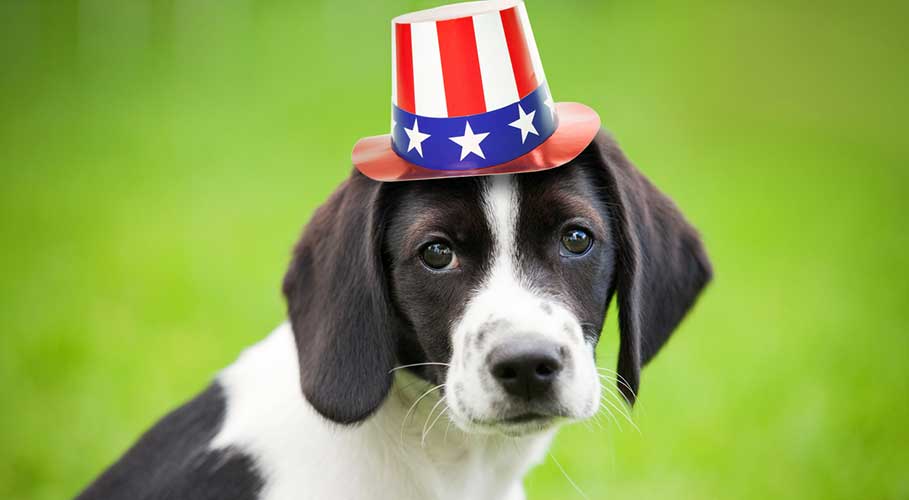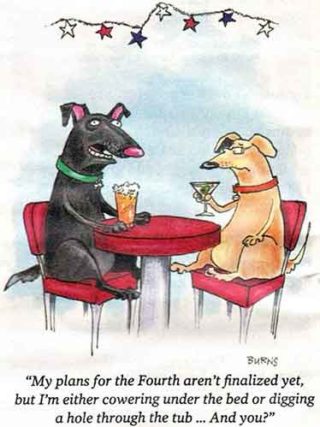Fear and Anxiety in Dogs with Fireworks
I love Independence Day. I’m looking forward to eating ice cream and BBQ and spending time relaxing with family. My kids are most excited about seeing the community fireworks. But I assure you, my furry kids are less than thrilled about all the fireworks. In fact, the pre-Fourth neighborhood pops and flashes already have them scared and confused. Luckily, as their veterinarian, I can help reduce their stress.
I’m here with advice on keeping pets calm during fireworks. It’s a big deal. For many pets, the Fourth of July is the most stressful day of the year. It can be dangerous, too. Fortunately, with a little planning we can make it stress-free for our dogs.
Common Signs of Pet Noise Anxiety
You may already notice your pets are showing signs of noise anxiety from early rounds of fireworks.
Pets with anxiety tremble, cower in the corner, pant heavily, drool or run off to hide under the bed.
If left alone, they may chew furniture, remotes or shoes—or tear through your house leaving you a big mess.
Risk for Runaways & Injury
Turns out the Fourth of July is the busiest day for shelters that take in stray pets. Anxious dogs may try to escape or bolt from homes and yards out of fear. Make sure their tags are up-to-date and that they’re wearing them at all times. Hopefully, your pet is also tagged with a microchip in case they do escape and turn up at a shelter.
If you crate your pet, take note! Crated pets may claw at the door or break their teeth and injure themselves trying to get out if they are not already crate trained. If you crate your pet on the Fourth, situate them in a safe quiet room with their crate door open so they don’t feel threatened and trapped.
Advice: Keeping Pets Calm During Fireworks
Based on your pet’s anxiety level there are different things your veterinarian at Vista Animal Hospital can do to help you keep your pet calm on the Fourth of July.
Create a Safe, Quiet Place – Find a room where your pet can feel safe. Make sure it’s quiet and away from noises and flashes. Basements and bathrooms often work well. If they are in a room with a window, turn the lights up to mask the flashes of light from outside. Consider running a fan for “white noise.” If you have a Pet Tunes Cube or other Bluetooth speaker, you can use classical music or ambient noise to help calm your pet and mask the sounds of thunder or fireworks.
Be a good example – When your pet is showing signs of anxiety, try to act normal and distract them. Engage your pet in a game or practice some obedience commands. Help them focus on something other than the noises outside. A special tasty treat may work if your pet is willing to indulge. Do not make a big deal about the noise.
Getting Help From Your Veterinarian
Starting from the Lowest Level Anxiety – Work with your vet to get a calming pheromone spray/diffuser or pheromone collar. This is a very natural and low cost intervention. These natural pheromones are a chemical that a mother dog releases when they’re nursing her puppies. It’s a calming hormone dogs can smell that may help relax pets with lower levels of anxiety even as an adult.
For added relief for your pet, talk with your vet at Vista Animal Hospital about natural supplements. We often recommend Composure treats that are made from natural ingredients to calm anxious dogs. These special treats contain B vitamins, milk proteins and L-theanine (a precursor to Gaba which is a calming neurotransmitter).
Moderate Anxiety – Talk to your vet about prescription anti-anxiety medications. These can be given for predictable times of stress and often don’t need to be sedating. This means we can reduce anxiety without making your pet too drowsy. The specific medication is based on your pet’s health.
Help for Pets with High or Chronic Anxiety and Panic – For pets that have more severe anxiety or panic attacks due to noise phobias, anti-anxiety medications that also cause sedation are helpful to allow the pet to sleep through the fear-inducing storm or fireworks. This is important to help prevent highly anxious dogs from harming themselves. When fears center around non-predictable thunderstorms, we find selective serotonin reuptake inhibitors (SSRIs) can help dogs get through the spring and summer months. SSRIs can take up to a month to begin working and are not likely to help in the few days leading up the Fourth of July.
Short-term Help in Times of Predictable Stress – The Fourth of July is a predictable stressful time for our pets. We know when the fireworks are going to happen. We may recommend certain medications you can give two hours before the neighborhood fireworks begin.
If your dog has a noise phobia, call us at 720-466-1414 for email us.
Or talk with your vet about how they can help. At Vista Animal Hospital, we carry the natural Composure calming treats. We also have pheromone collars. And our in-house pharmacy has various prescription medications to help your dog get through the Fourth of July.
Click to learn more about Dr. Bonnie Abbott
Next up later in July we’ll tackle Calming Your Dog During Thunderstorms.




